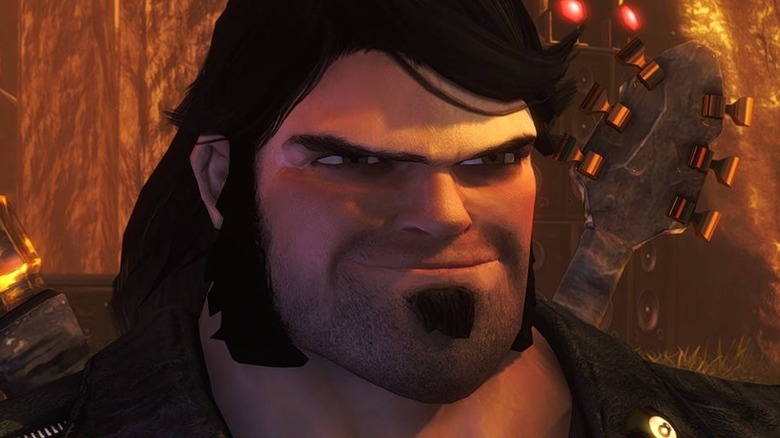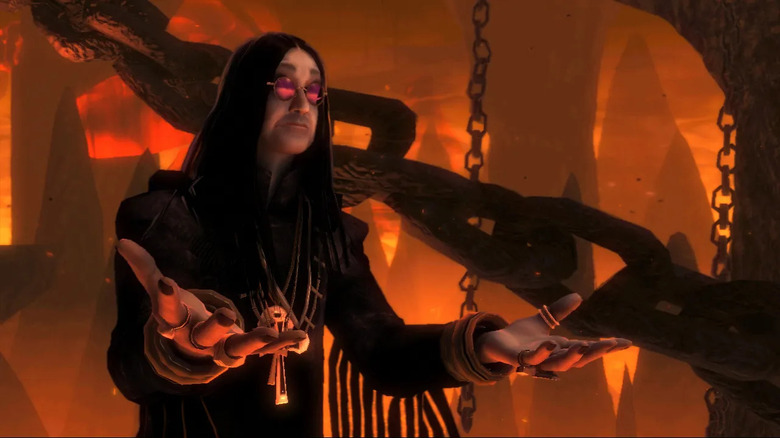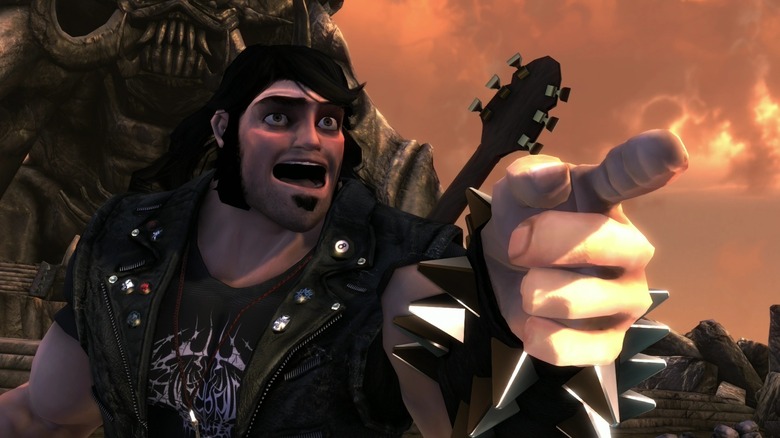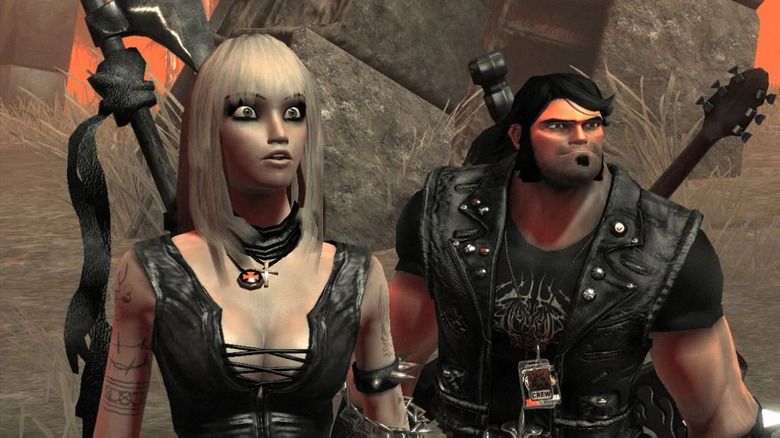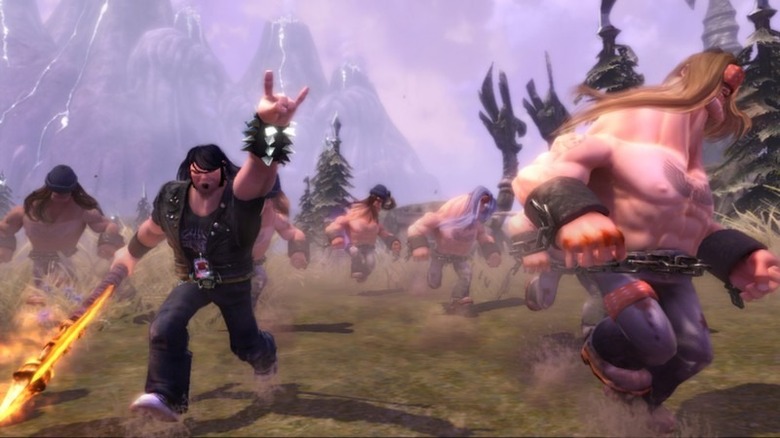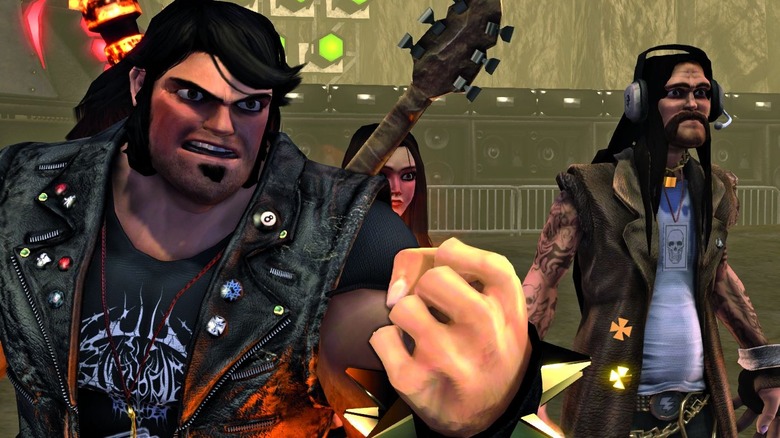Brütal Legend Ended Up Being A Massive Flop For EA - Here's Why
When EA announced "Brütal Legend" in 2007, hopes were high for the action game. The new title from developer Double Fine was bringing together a perfect combination of elements to craft an amazing game. It had the design of Tim Schafer and the humor of comedian Jack Black. The story and setting were a mix of heavy metal and high fantasy. It even included the voices and music of some of the biggest stars of classic rock. On paper, it was set to become an amazing game and a hit for Double Fine and its publisher, EA. Instead, "Brütal Legend" turned out to be a massive flop.
Despite receiving generally positive reviews, "Brütal Legend" sold poorly and divided audiences. A planned sequel was subsequently canceled and Double Fine nearly folded as a result (per Rock Paper Shotgun). While the studio would eventually recover, "Brütal Legend" never became a series and EA wrote it off as a loss.
The question is, how could a game with so much promise bomb so badly. What happened to "Brütal Legend?"
A rockin' start
There was certainly reason for fans to be excited when the game was announced in 2007. "Brütal Legend" was from the mind of Tim Schafer, the game developer who had helped create such classics as the "Monkey Island" series and "Day of the Tentacle." The new game was also the second title from Shafer's new studio, Double Fine, which had previously developed the cult classic and flop turned success story, "Psychonauts."
It also starred Jack Black, at the height of his stardom, playing Eddie Riggs, the heavy metal roadie transported into a fantasy world infused with rock music and the look of rock album covers. In addition to Black, it also included the voices of such rock legends as Lemmy of Motörhead, Rob Halford of Judas Priest, and Ozzy Osbourne in his only video game role.
As soon as it was revealed, "Brütal Legend" received positive media attention and quickly became a highly anticipated title among critics and fans (per Destructoid). Despite all the positive energy behind the game, however, things quickly went south for Double Fine.
Mid-development publisher turmoil
Even before the release of the game, Double Fine was facing trouble that threatened "Brütal Legend" and complicated its later development.
Double Fine had originally concluded a deal with Vivendi Games to publish "Brütal Legend" but, when Vivendi merged with Activision, this deal was suddenly called into question. It seemed that Activision — now Activision Blizzard — was less impressed with the game and chose to drop the project. This became ugly and personal when Tim Schafer and CEO Bobby Kotick, sometimes associated with the shady side of Activision Blizzard, exchanged personal attacks against one another (per Eurogamer).
While EA quickly picked up "Brütal Legend" and became its new publisher, a legal battle subsequently ensued when Activision Blizzard claimed to still own the game (per Variety). While the case was eventually settled out of court, at least one member of the Double Fine team argued that the court drama impacted the game's development and caused strain for Schafer and the rest of the studio (per Game Developer).
Publisher woes weren't the only issues to harm the game either.
Marketing missteps
In addition to legal issues outside of its control, Double Fine and EA also made some mistakes of their own. In promoting the game, not all the commercials and previews managed to capture the epic, metal tone the game was going for and gamers weren't given an entirely accurate representation of what to expect from "Brütal Legend." These missteps were apparently driven by a concern for appealing to a broader audience.
While "Brütal Legend" was inspired by the classics of heavy metal, advertisements, particularly on TV, didn't always show off this vibe and the major stars that were a part of the game. Wired speculated at the time that this was designed to attract an audience beyond metalheads, but it arguably prevented the game from making a strong impression.
Further, promotion of the game largely downplayed or simply ignored the RTS elements that would be a core part of the experience. Double Fine had been pushed by Vivendi, when it was still publishing, to present "Brütal Legend" as an action game out of concern that console players would be turned off by an RTS (per Game Developer). As a result, neither players nor critics knew exactly what to expect when the game launched in 2009.
Great story and weak gameplay
Sure enough, when "Brütal Legend" released, the elements of the game that had been presented to the public received praise from fans and critics, while the RTS gameplay was the subject of the most negativity.
Many deemed the game's story to be worthy of becoming a movie or TV show, and the music and voice acting were noted highlights. The gameplay, however, didn't fare so well.
While some found the RTS battles enjoyable (per IGN), many others argued that they were the low point of the experience and detracted from the enjoyment of the story and world (per Game Informer). It didn't help that these elements came as a surprise, having not been advertised or even explained on the game's packaging (per Wired).
These drawbacks apparently drove poor sales and the cancellation of a sequel (per Destructoid) the game had set up. After all the hard work and struggle for Schafer and Double Fine, "Brütal Legend" proved to be a flop.
Cult status
Today, "Brütal Legend" has a complicated legacy. Fans continue to be divided about the game (per Destructoid). While some still count it as a disappointment, it has achieved a cult following among many who argue it was underrated.
"Brütal Legend" has been called a hidden gem and many will argue it's still worth playing. Some even claim it's still deserving of a sequel in the future. It may not have gotten much love at the time and proved to be a flop for EA, it lives on in the minds of many gamers and rockers to this day.
Since then, Double Fine has struck off on its own to become its own publisher (per Games Industry Biz). Further, Schafer has expressed a desire to return to the series (per TheGamer) so it's possible fans may see the end of Eddie Rigg's adventure someday. Until then, the game will remain a divisive subject that some fans continue to remember fondly and that EA would rather forget.

